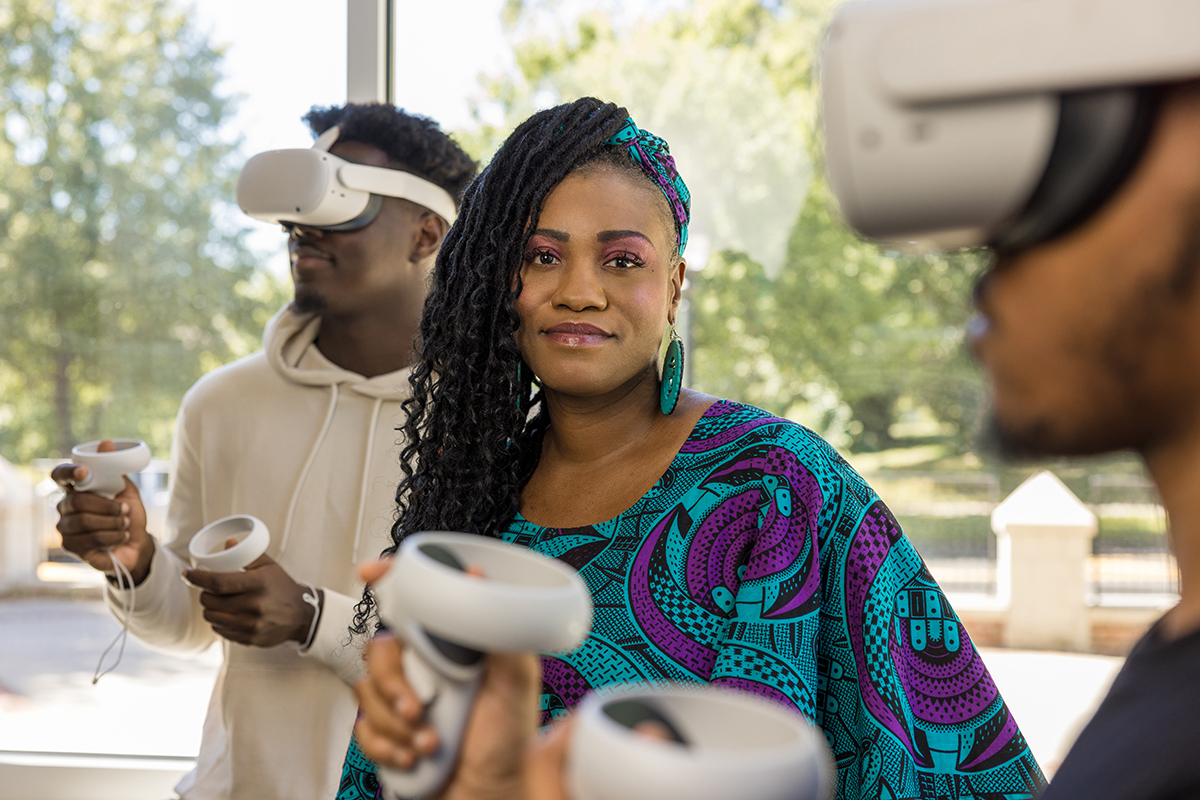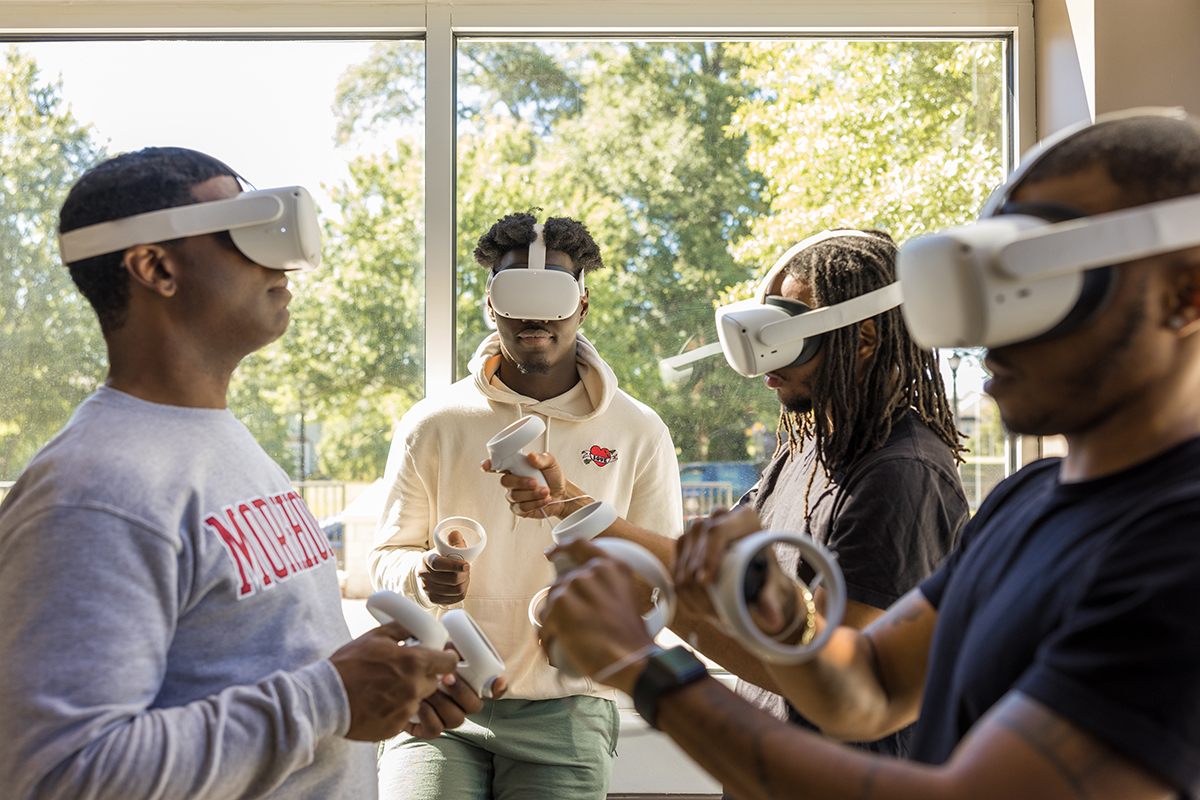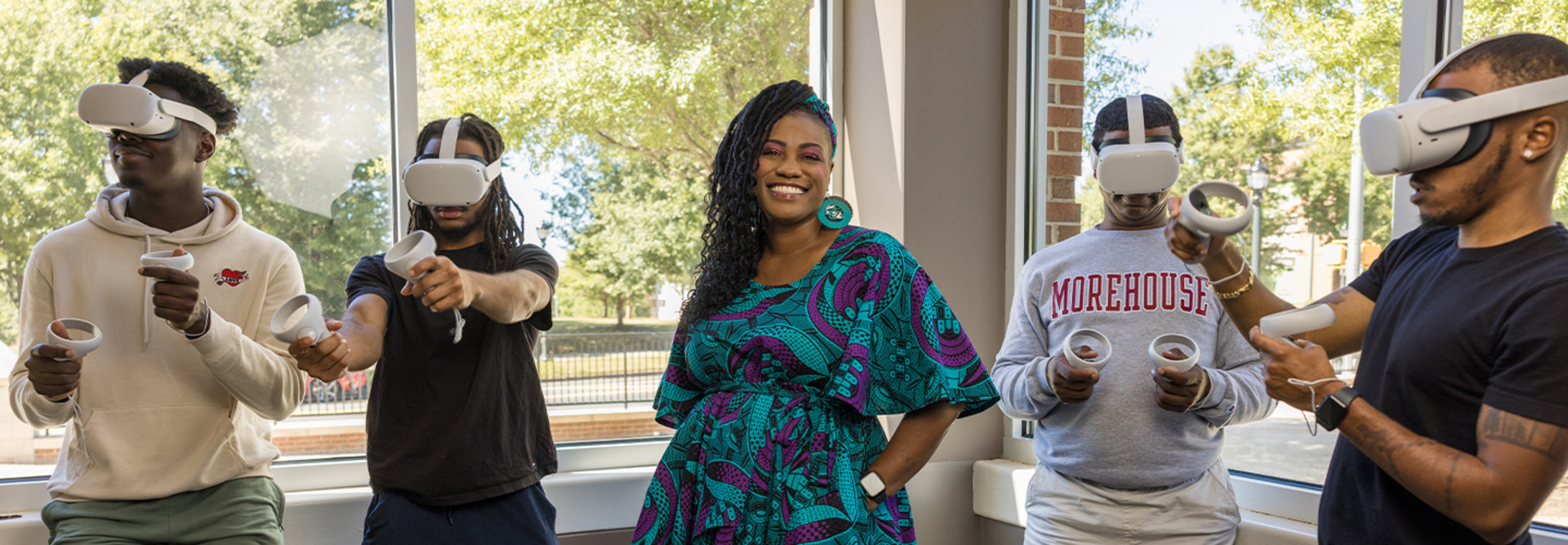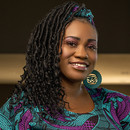Morehouse College in Atlanta has become a leader in virtual reality education among historically Black colleges and universities. EdTech: Focus on Higher Education spoke to Muhsinah Morris, Morehouse’s metaversity director, assistant professor and principal investigator of the Morris Research and Innovation Lab, about VR’s unique ability to support Black students and reignite their joy in learning.
EDTECH: What is Morehouse in the Metaverse?
MORRIS: Morehouse in the Metaverse started as a proof of concept that a VR campus can come to fruition. Our partner, VictoryXR, has been the secret sauce throughout. It helped us develop a digital twin of Morehouse that’s accessible through various VR headsets. We started off in three courses, and now we have 10 courses that are fully in VR. Students can join from anywhere, but several courses have students bring their headsets to class so they can experience the Metaverse together.
Click the banner below for exclusive content about emerging technologies in higher ed.
EDTECH: How have students responded to learning in VR?
MORRIS: Seniors who took advanced inorganic chemistry felt they would have been better chemists if they had this in their freshman year. In this course, you have to be able to visualize molecules and molecular geometry and understand complex chemical reactions. VR helps students visualize the molecular world in a way they haven’t been able to the entire time they’ve been studying chemistry. They get to experience molecules blown up to room size. They were able to do problem-based learning activities. A lot of them want to go into health professions, so they could explore inside a body and look at anatomical structures.
EDTECH: How is VR especially valuable for HBCUs?
MORRIS: As an HBCU, a lot of our pedagogy is based on culturally responsive spaces and making sure our students can identify with content that typically doesn’t feel like it’s for them. We’re creating an engaging space that they want to inhabit and that makes them feel comfortable.

In creating our digital twin of Morehouse, we augmented the space with artifacts from the actual campus. In our hallways, students see African pieces of art and elements of history by African American people who have done amazing things in their fields. We’ve created a world that they’re familiar with, using cutting-edge technology to do it.
READ MORE: How emerging technologies help HBCUs retain students.
EDTECH: How can VR expand inclusion and representation in ways that traditional learning may not?
MORRIS: I teach in the education department now and have taught in the chemistry department for my entire career. In my course about exceptional learners, we talk about differentiating instruction for the differently abled and using technological strategies to make sure teachers create the right accommodations.
Our students will get an opportunity to create, in VR, scenarios that will accommodate learners who have physical disabilities or who are neurodivergent. How do we develop technological tools and solutions to accommodate their needs? How can we create experiences that will instill a sense of belonging? Being mindful of that helps teachers create pathways and be more creative in the types of activities they bring into the space.
EDTECH: How can VR’s versatility help to personalize learning?
MORRIS: I call this offering “opportunistic reality” for our students. Extended reality technologies help them to hope, endure and persist through complex materials and challenging aspects of their disciplines. Being exposed to this technology at this level gives them a vantage point that others may not have, which is critical for young Black men, especially those we serve at Morehouse.
Young Black men make up only 2 percent of education professionals. It’s critical for them to come into the workforce knowing how to use XR technologies and how to build curriculum in XR. Having experienced it as students and as pre-service teachers is important. It provides opportunities that our students don’t often have. They get an opportunity to develop, create and have autonomy over a space that is on the cutting edge.
EDTECH: What results have you seen at Morehouse?
MORRIS: In our history course, we saw a 10 percentage point increase in attendance compared with traditional face-to-face classes. We have seen a rise in student engagement and a significant increase in students’ final grades. Not only do students want this type of technology, but the numbers show that it’s made a difference.

EDTECH: How else are you using VR to serve the campus community?
MORRIS: We’ve had commencement services in the Metaverse and a virtual gala to accompany our annual “A Candle in the Dark” Gala, which celebrates African American achievement and raises scholarship funds. We have Meditation Mondays, and we have fitness initiatives coming this fall led by our kinesiology program. We’re moving full steam ahead to give more students an opportunity to use this technology.
EDTECH: What makes you most excited about VR?
MORRIS: When I see students understand their fields in a way that drives curiosity — where they’re not confined to antiquated learning conditions, but rather they’re optimized in this space — I see their joy. In many cases, that part of the educational system has been lost. When we’re young, we ask questions because we are genuinely curious, and as we go through the system, we lose that, and a part of our spirit gets crushed in that process. It’s really good to be back in a space of joy and possibility for students who didn’t think that existed for them anymore. That is the “opportunistic reality,” not just for students but also for the faculty.
UP NEXT: CDW launches Legacy Excellence Program.












